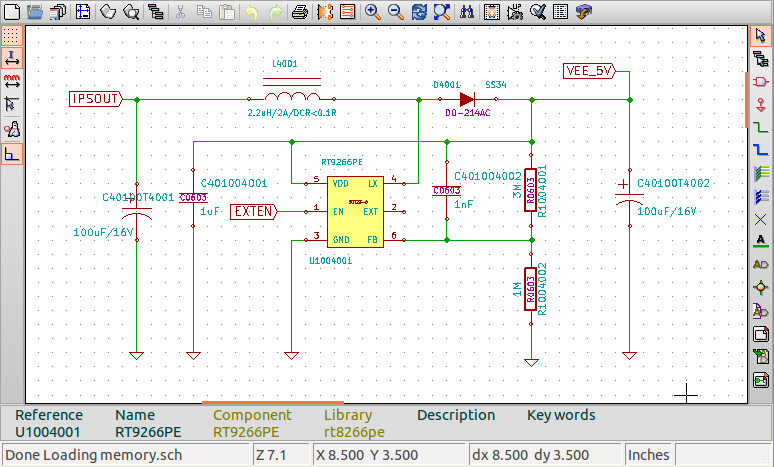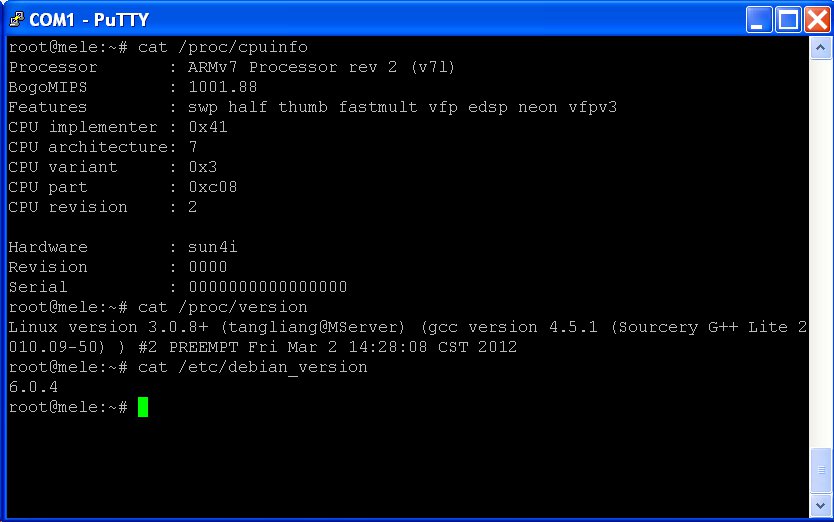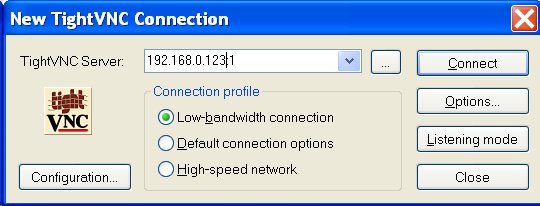Last week, Collabora and Fluendo jointly announced the release of an open source software development kit (SDK ) for GStreamer multimedia framework. The SDK aims at easing the integration of Gstreamer into projects and provides a pre-built version of the framework which is available for Linux, Windows and Mac OS X. GStreamer is used in many Linux applications such as media players (Rhythmbox, Banshee and Amarok), video editors (PitiVi), and media centers such as XBMC among other applications. It’s also often the framework used to play videos on ARM platforms with implementations for OMAP 4/5 and devices compliant with the OpenMAX standard. Gstreamer website has also been updated and provides links to download GStreamer SDK and documentation on the home page. The new documentation looks pretty good with fives main sections: Instructions for installing the SDK on Linux (Ubuntu, Debian and Fedora), Windows or Mac OS. 11 basic and 2 advanced tutorials. […]
Raspberry Pi Debian Wheezy Alpha, Bodhi Linux Alpha and Pwn, A Security Test Suite
I still haven’t received my Raspberry Pi board, but there have been a couple of interesting Raspberry Pi software news this week. Raspberry Pi Debian Wheezy “Alpha” This is an update to Raspberry Pi Debian Squeeze 6.0, based on Wheezy (Debian 7.0) and the maintainer (Alex) is looking for volunteer to help test it and iron it out, before the Raspberry Pi foundation officially announce the distribution on its blog. This distribution comes will the following: * Scratch, Python, Midori etc as before * A configuration tool for common initial setup tasks (resize root partition, change keyboard layout) * omxplayer * USB drives auto mount * Lots more This is alpha quality, so you can’t expect it something very stable, but if you want to test drive it, you can download it via BitTorrent (447 MB). Sha1sum: bdad7f1c504e22f8d754028843abb9da4330107f. You can login with the following credentials: User: pi | password:raspberry Known […]
Linaro 12.05 Release with Kernel 3.4 and Android 4.0.4
Linaro has just released version 12.05 based on Linux Kernel 3.4 and Android 4.0.4. This release provides lots of improvement for Origen (Samsung Exynos 4) on Android, further work has been done on big.LITTLE processing and ARMv8 work appears to have started for Ubuntu and Debian. armel vs armhf benchmarks show a massive improvement (up to 15x) when using armhf for povray (3D rendering),. but for most other tests, there is little improvement, and in some rare cases armhf is slightly slower than armel. Here are the highlights of the release: Android Created a stable Google hangout build for Origen Updated DS-5 and gator daemon to 5.10 Stress tests from big.LITTLE testing have been integrated into LAVA Completed big.LITTLE Android tasks Monkeyrunner tests for automating common Android usage have been integrated into LAVA Ordered a new power measurement device from National Instruments Updated and Origen 3.4 rc7 Completed Android HAL […]
Schematics Capture and PCB Layout in Linux with Kicad
Most schematics capture and PCB layout software run on Windows and are closed source. But if your favorite OS is Linux, there are a few open source software including Kicad and gEDA. There is also Cadsoft Eagle which can be installed in Linux with a free license for hobbyists and educational purposes, but is not open source. Today, I’ll focus on Kicad. I don’t really capture schematics, let alone layout PCBs, but I sometimes need to use this type of software to locate pins/components on the schematics and PCB and check some parts of the schematics that can affect software. So I will mainly give an overview of Kicad and write my experience trying to import another project (Beagleboard XM) to Kicad. If you want to learn how to get started with your own project with Kicad, you might want to have a look at Teho Labs Kicad Tutorial. In […]
How to Create Your Own Debian / Ubuntu Image for Mele A1000 (AllWinner A10 Based STB)
Developers working on AllWinner A10 have released an Ubuntu 10.04 LTS SD card image (4GB) for the Mele A1000. I’ll show how you can create your own Debian or Ubuntu image based on this image for any size of SD Card using Debian 6.0 (Squeeze) and the recent Ubuntu 12.04 (Precise Pangolin) as example. The current image is not perfect, for example Ethernet doesn’t work (but you can still get network connectivity with WiFi), the NAND flash can not be accessed, the system does not appear to be very stable when running X and a few more issues. But this will be fixed by the developer community over time. First download the SD card image wget http://hands.com/~lkcl/mele-ubuntu-lucid.img.lzma Install 7z (if you don’t have it yet) and decompress the file: sudo apt-get install p7zip-full 7z x mele-ubuntu-lucid.img.lzma The decompressed size is 4008706048, which might be larger than your 4GB SD Card […]
Raspberry Pi Releases 19-04-2012 Debian and Arch Linux Images
Within less than a week, a new image for Raspberry Pi Debian has been released as well as an Arch Linux image. Debian 6 can be downloaded via: BitTorrent – debian6-19-04-2012.zip.torrent Direct HTTP download – debian6-19-04-2012.zip Username/Password: root/raspberrypi Arch Linux can be downloaded via: BitTorrent – archlinuxarm-19-04-2012.zip.torrent Direct HTTP download – archlinuxarm-19-04-2012.zip Username/Password: root/root The following Changelog is provided for Debian 6 release: Overscan adjustments ALSA driver Re-enable 1600×1200 output (regression in 13-04-2012 release) Boot file tidyup – and remove test cmdline file vcgencmd provides a version number Fixes for EDID parsing Drive DMT modes in DVI modes by default, even if HDMI is reported as supported Some initial packages that might make setting up Wi-Fi possible Includes the non-free software source (nothing from it though) – useful for Wi-Fi firmware Qt5 snapshot A small package that will allow Raspberry Pi to be used as for Qt5 development out of […]
How-to Setup a VNC Remote Connection to a Raspberry Pi
I don’t have a Raspberry Pi board, yet I’m using one right now remotely thanks to the VNC (Virtual Network Computing) protocol. The Raspberry Pi I use runs the latest Debian-13-04-2012 image. Here’s how to do to access the Raspberry Pi desktop in Windows XP. These instructions could also be followed to connect to any remote networked Linux device with minor modifications. Connect to the Raspberry Pi via SSH Install a VNC server (e.g. tightvncserver): # sudo apt-get install tightvncserver Run startx in the background # startx & Start the VNC server (it will ask a password of your choice): # tightvncserver New ‘X’ desktop is raspberrypi:1 Starting applications specified in /home/cnxsoft/.vnc/xstartup Log file is /home/cnxsoft/.vnc/raspberrypi:1.log Back to your computer. Install a VNC client such as TightVNC for Windows. You only need to select “TightVNC Viewer” during installation. Start TightVNC Viewer (In Windows XP, Start->All Programs->TightVNC->TightVNC Viewer) Enter the Raspberry […]
Second Release of Debian 6 for Raspberry Pi
As Raspberry Pi boards have started to ship this week, the Raspberry Pi foundation has also posted a new Debian 6.0 “squeeze” release to the downloads section of raspberrypi.org this week-end. This release contains several performance enhancements, including enabling the 128K system L2 cache for the first time, and first-cut ALSA drivers. Enabling the L2 cache will boost the ARM CPU performance, however, it may decrease the GPU performance. So this setup is ideal for headless server, but for other applications, for example a media player decoding 1080p30 videos, the performance might actually go down. This is still customizable, as the L2 cache can be enabled / disabled with enable_l2cache parameter in the config.txt file stored on the SD card. The ALSA drivers are here for audio support, so audio output might not have been supported in the first release (TBC), except if they used another type of audio drivers […]





